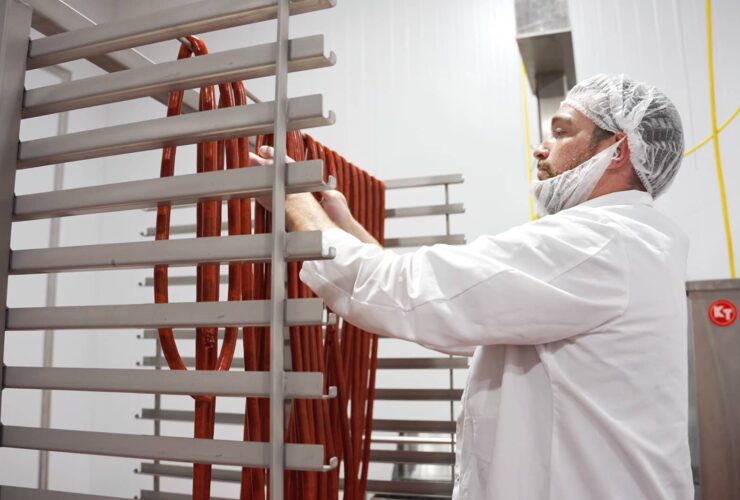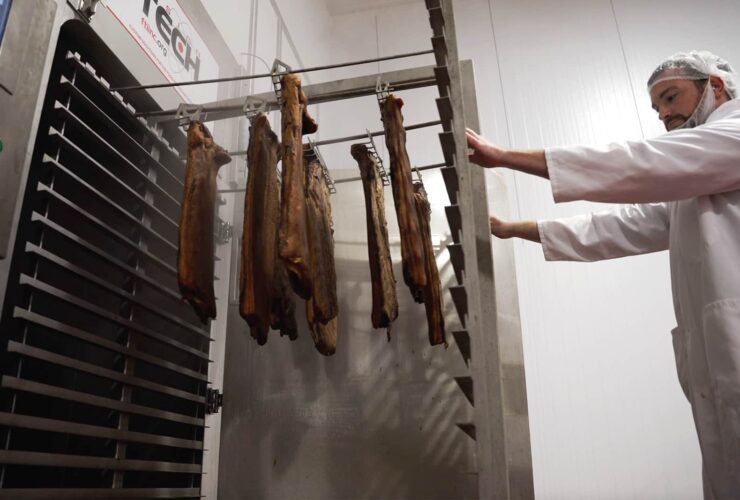A commercial smokehouse or dehydrator is a big investment — one that requires regular and ongoing maintenance to ensure a long oven life.
Commercial oven manufacturers provide information on how and what should be routinely inspected and maintained, but in many facilities, those instructions are often buried in a user manual that gets stuck in a drawer somewhere or made inaccessible to maintenance personnel.
Regular preventative maintenance is necessary to keep your oven operating for a long period of time.
Benefits of Preventative Oven Maintenance
A smokehouse or dehydrator is like any other equipment in your facility — over time it will wear down and component parts will need to be replaced, either in advance or after the component part fails and the oven experiences costly downtime.
Performing regular maintenance checks on your smokehouse or dehydrator is a smart choice — and one you should take seriously.
Here are just a few reasons why you need a preventative maintenance schedule for your oven:
- Catch failing components before they cause a shutdown
- Ensures the efficiency of your oven
- Prevents changes to the oven breakpoint which could result in inconsistent product cooking
- Prevents costly downtime for repairs
- It keeps your oven running more efficiently for a longer period of time
Recommended Oven Maintenance Schedule
Every smokehouse or dehydrator is different and may require a slightly modified maintenance schedule, but most oven manufacturers will recommend a preventative maintenance schedule that follows this format.
Refer to the user manual for your specific ovens to finalize a preventative maintenance schedule.
Daily Maintenance Checks
The following preventative maintenance should be performed on your smokehouse or dehydrator on a daily basis:
- Wet Sock
While some wet socks can be used for longer periods of time, it is recommended to change them each day. Wet socks are very inexpensive and ensuring a fresh wet sock each day is a negligible price to ensure a costly error doesn’t occur. - Product Probe Calibration
We recommend calibrating product probes on a daily basis to prevent issues in your HACCP program and the risk of a costly recall that could occur if product probes haven’t been calibrated in weeks. - Psychrometer Pan
Ensure water is slowly dripping into the pan. - Rotating Dampers
Inspect damper positioning to make sure dampers are 90 degrees clocked from each other (+/- 1 degree). - Compressed Air
Ensure compressed air is coming in at the right temperature
Weekly Maintenance Checks
The following preventative maintenance should be performed on your smokehouse or dehydrator on a weekly basis:
- Door Seals
Look for cracks, tears, or holes in the door seals. - Temperature Probe
Check the core temperature probe for any damage and calibrate. - Steam Coils
Visually check the steam coils for leaks or any foreign matter that may be caught in the fins reducing airflow. - Gas / Steam Valves
Check for leaks and stuck valves. - Air and Water Filters
Verify the filters are clean and not restricting flow into the oven control system. - Natural Smoke
Check for smoke leaks. - Air / Water Atomization Nozzles
Validate that the humidity system is working properly. Adjust if needed. - Fresh Air and Exhaust Dampers
Check the fresh air/exhaust damper position (if applicable). - Clean the Oven
Clean the unit with a smoke tar removing detergent.
Monthly Maintenance Checks
The following preventative maintenance should be performed on your smokehouse or dehydrator on a monthly basis:
- Wet Bulb
Calibrate the wet bulb sensor. - Product Shower
Inspect all spray nozzles to verify they are working properly. Clean or replace if necessary. - Lubrication
Lubricate all bearings. - Gas Burner System
Check the flame to verify it is a billowing type, blue with yellowish-orange tips. Contact a qualified service person to adjust the flame if necessary. - Main Blower
Check the fan wheel for any wear or corrosion, and check the v-belt drive for proper alignment, tension, and wear. Check all set screws and bolts to verify they are tight. Check bearings for lubrication. - Cleaning System
Inspect all spray nozzles to verify they are working properly. Clean or replace if necessary. - Fresh Air and Exhaust Dampers
Check the fresh air/exhaust damper position (if applicable).
Quarterly Maintenance Checks
The following preventative maintenance should be performed on your smokehouse or dehydrator on a quarterly basis:
- Steam Coils
Inspect steam coils for leaks and corrosion. Verify that the fins are not collapsed or folded over. Check past graphs to verify that the oven reaches temperature in the same amount of time. - Gas Train
Inspect gas train for leaks. - Fresh Air Intake Damper
Verify the damper opens and closes mechanically. - Actuator Travel
Verify actuator travel falls within recommended levels:- Steam Heat: 3-15 psi
- Steam Cook: 3-15 psi
- Steam Humidity: 9-15 psi
- Fresh Air & Exhaust: 3-8 psi
Annual Maintenance Checks
The following preventative maintenance should be performed on your smokehouse or dehydrator on a yearly basis:
- Cabinet & Blower Housing
Inspect entire cabinet and blower housing for cracks or broken welds which can occur from the expansion and contraction cycles of your oven. - Gas Burner
Perform a leak test on the gas burner and verify safeties are operational. Replace if necessary. - CIP and Product Shower
Flush all lines to ensure no obstructions.
Ensure Longer Oven Life
Preventative maintenance is the key to keeping your oven operating at peak efficiency for a longer period of time.
Use the schedule template above, refer to the user manuals for your ovens, and develop a preventative maintenance schedule that will ensure you are inspecting your ovens on a daily, weekly, monthly, quarterly, and annual basis.
It will increase time on your maintenance team, but the returns will save you from costly downtime, leaks, and even damage to your oven.




